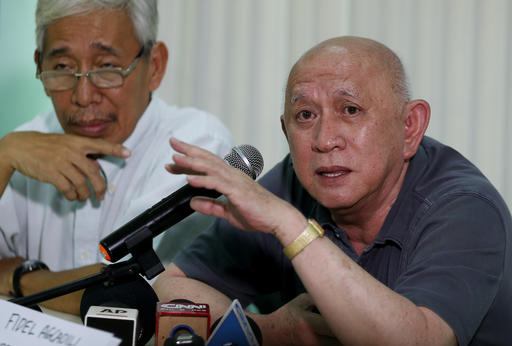
Communist rebel negotiator Fidel Agcaoili, (right), gestures during a rare news conference, Thursday, June 2, 2016 in Quezon city, (AP Photo/Bullit Marquez)
DAVAO CITY – The sneaky burial of dictator Ferdinand Marcos is an issue that should not be overlooked but it would not derail the peace talks between the Philippine government and the National Democratic Front of the Philippines, according to a top communist leader.
Fidel Agcaoili, chief negotiator of the NDFP, the political negotiating arm of the Communist Party of the Philippines and New People’s Army, told the Philippine Daily Inquirer that the cordial relationship between President Duterte and the communist movement has remained despite the furor over the burial of Marcos at the Libingan ng mga Bayani, and that the ongoing negotiations would continue as scheduled.
But Agcaoili said the NDFP has been observing closely each and every move of the government.
“For now, it is a developing question,” Agcaoili said referring to the Marcos issue and their relations with Duterte.
Agcaoili said it would be “too forward” or premature for the NDFP to say that the Marcos burial would adversely affect the talks.
“We will wait how the issue develops,” Agcaoili said.
Immediately after the election, President Duterte reached out to the Left, both the legal and underground movements, to explore ways to settle the almost five-decade long conflict.
To show his sincerity, Mr. Duterte opened the government and offered Cabinet positions to the top leaders of the Communist Party of the Philippines.
The CPP, however, refused and instead offered the opportunity to recommend political activists in the country.
Despite the close relations between the Left and Duterte, the revolutionary movement has implemented and maintained its policy of guarded optimism towards the Duterte administration.
While working with the administration, the revolutionary movement would be consistent in criticizing anti-people policies and statements from President Duterte and his administration, the CPP explained earlier.
But Agcaoili said they would not be coopted and that accountability for government’s actions must still be demanded.
He reminded President Duterte that Marcos’ crimes during his dictatorial rule were well established in court.
Duterte earlier said that his government was just following legal procedures in allowing the burial.
“There is a judgment in a US federal court. You cannot deny that,” Agcaoili said, referring to the financial award granted by a US court to martial law victims against the Marcos estate.
Agcaoili expressed alarm over the continuing efforts of the Marcoses to regain power without any remorse.
“The Marcoses continue to be non-apologetic,” Agcaoili said.
The people must be relentless in hounding the Marcoses for their alleged crimes including thousands of human rights violations and the syphoning of public funds, he said.
Agcaoili said victims of Martial Law must pursue their claims and demand justice.
“For the government to fail in giving compensation for the victims is an outright violation of the Comprehensive Agreement on Respect for Human Rights and International Humanitarian Law (CARHRIHL),” Agcaoili said. And, he said, this can be grounds for violations to the peace process and would affect the formal talks.
(During the presidency of Benigno Aquino III, Congress passed a law instituting a commission to review, process and approve claims of human rights violations filed by martial law victims during the 1970s.)
The Philippine government and the NDFP have agreed in the framework of the peace process that there could be no peace in the country until justice issues are addressed.
He said the Left must support the mounting protests against the sneaky burial of Marcos must be supported.
“It would be nice to the extent that the mass movement would really grow and strengthen,” Agcaoili said.
Groups from various sectors will hold nationwide protests on November 25 to express disgust over the burial of Marcos at the Libingan ng mga Bayani.
When President Duterte announced he was allowing the burial of Marcos at the Libingan ng mga Bayani, seven petitions were filed at the Supreme Court against it. Two status quo ante orders were issued, stopping the burial until Nov. 8. On Nov. 8, the Supreme Court voted 9-5-1 allowing the burial, saying President Duterte did not commit grave abuse of discretion when he allowed the burial of Marcos at the Libingan, which under the law has been reserved for former presidents, soldiers, dignitaries and public figures worthy of emulation. The high court upheld Duterte’s argument that as a former president and a veteran of World War II who had received a Medal of Valor, Marcos was qualified to be interred at the Libingan ng mga Bayani. It also lifted the status quo ante order, effectively removing any legal barrier to the burial.
Supreme Court spokesman Theodore Te told media a day after the sudden burial on Nov. 18 and protests erupted, that that there was no motion for reconsideration filed by the petitioners and no order from the Supreme Court stopping the burial; hence, it was legal. SFM